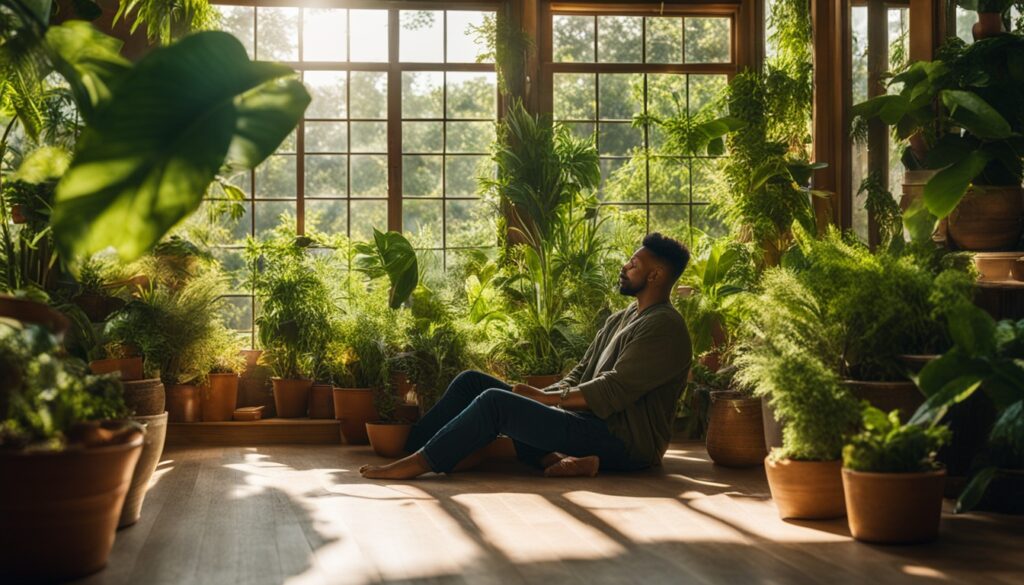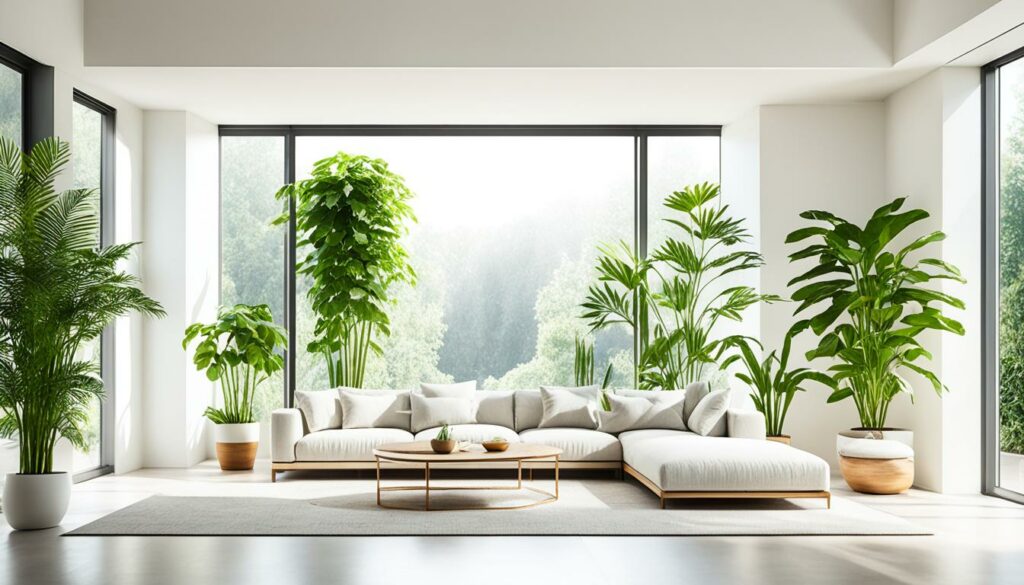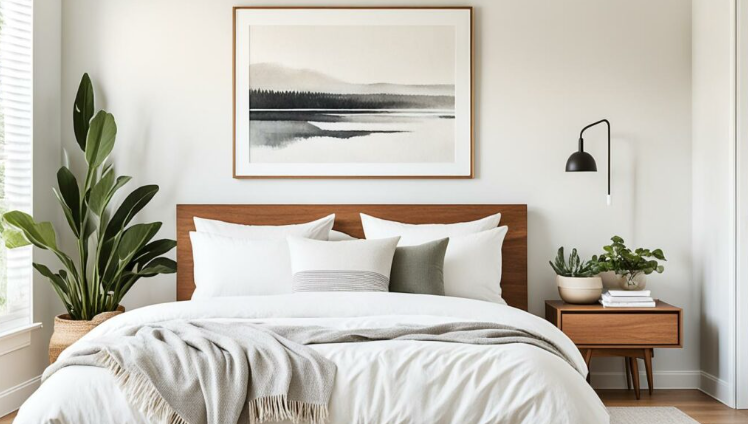Creating a calm, clutter-free space is key for relaxation and better mental health. Clutter can make you feel stressed, while an organized space helps you relax and think clearly at home. Studies show that living in a cluttered home can make you more stressed than living in a tidy one1. Decluttering can also make you feel calm and relaxed, which can improve your life quality1.
Starting to organize your life can help you see how clutter affects your health. Getting rid of things you don’t need makes your space calm and helps you have better days. A tidy home means better sleep, especially if you keep electronics away, and helps you relax. This way of living can make you healthier, happier, and can spread positive changes.
Key Takeaways
Understanding the Importance of a Stress-Free Home
Having a calm and tidy living space is key for a stress-free environment. Studies link a messy space to more stress hormones, which can harm our mental health2. A clean home makes us happier and more content2. A tidy space lowers stress, helps us focus better, boosts our confidence, and makes us relax2.
Many people, especially introverts, like simple and peaceful living spaces3. A tidy home reduces anxiety and cuts down on distractions3. Getting rid of clutter improves our mental clarity and helps us find our purpose3. Also, clean spaces mean less anxiety and better sleep by 50% and 35% respectively4.
Setting a cleaning routine with family helps everyone work together and keep things clean2. Simple decluttering steps like cleaning surfaces and organizing our areas make us more relaxed and calm3. When you focus on creating a stress-free home, think about how your space affects your health and mood.
How Clutter Affects Your Mental Well-Being
Clutter in your living space can really affect your mental health. A study by Princeton University found that clutter can make you feel stressed5. Women who liked their homes felt less stressed than those who didn’t6. This shows that a messy environment can make you more anxious.
Too much stuff can make you feel overwhelmed and stressed. Research from the University of Connecticut says that less clutter means less stress and more happiness5. People with hoarding disorder find it hard to let go of things, which makes decluttering tough for them6. About 2.5% of Americans have this condition, showing how deeply clutter can affect your mind.
Getting rid of clutter makes your space calmer and helps reduce stress. Start by decluttering a little at a time5. Focus on one area at a time to feel a sense of achievement and improve your mood5. Keeping your living space tidy helps your mental health and makes life better overall.
Benefits of Decluttering Your Living Space
Decluttering brings many benefits that make daily life better. It helps you focus and think clearly. It also makes relationships stronger and boosts your self-esteem. Living in an organized space brings calmness, which is good for your well-being.
Better Focus and Mental Clarity
A tidy environment helps you concentrate and be more productive. Studies show that clutter can make stress worse, especially for young moms with babies7. Having less clutter helps you pay attention better, which makes you finish tasks faster and stay focused7. Decluttering can also save you money over time because you need to fix fewer things8.
Improved Relationships
Living in an organized home means fewer fights over clutter. Clutter leads to feelings of confusion and tension, which can hurt how you talk to others9. A tidy space shows you value intentional living, which can make your relationships healthier8.
Enhanced Self-Esteem and Confidence
Decluttering can make you feel better about yourself and lead to healthier habits9. Feeling proud after organizing your space builds confidence. It helps you know what you value and makes you more mindful in your choices8. Plus, a clean space helps you relax, improves your mood, and makes you sleep better9.
Creating Calm: Clutter-Free Spaces Promote Relaxation
Having a clutter-free home can really boost your well-being. Spaces that are mindful help you relax and lower stress and anxiety10. Being organized makes you feel calm and peaceful, letting you breathe easier10. By arranging things neatly, you make a peaceful place that helps you focus and be mindful. This is key to lowering stress.
Natural light, soft colors, and cozy furniture are key to feeling calm. Studies show that natural light makes you happier and helps you sleep better1011. Soft lights and plants make your home feel more relaxing1011. Colors like blue and green are calming, making spaces perfect for unwinding11.
Adding areas for activities like meditation or yoga helps you focus on your mental health. These spaces support calmness and improve your relationships with others10.
The Role of Color in Promoting Serenity
Color plays a big role in making your home feel welcoming and can affect your mood. Using a neutral color palette helps create a peaceful and inviting space. These colors give your space a timeless elegance and calmness.
Utilizing Neutral Color Palettes
Neutral colors like beige, gray, and soft white make up a palette that’s both versatile and soothing. They make your space feel bigger and more welcoming. Adding these colors to your living area can make it a place where you feel relaxed.
Choosing Elegant Neutral Shades
- A clutter-free space leads to lower stress levels and enhanced relaxation.
- Decluttering can improve sleep quality by reducing exposure to electronics.
- Neutral colors and textures in home decor help create a soothing atmosphere.
- Indoor plants positively affect mental health and air quality.
- Natural light exposure is linked to improved mood and reduced stress levels.
- Regularly organizing your space fosters better focus and decision-making.
Neutral colors bring tranquility and comfort. Colors like blue and green are calming and help you relax. Choosing elegant neutral shades can make your space a place to unwind. These colors also give your space a timeless look that fits any decor.
| Color | Effect on Mood | Notes |
|---|---|---|
| Red | Passionate, Exciting | May cause anxiety in excess. |
| Blue | Calm, Tranquil | Promotes relaxation but can lead to sadness if overused. |
| Yellow | Positive, Optimistic | Too much can irritate. |
| Green | Balance, Harmony | Excess may lead to boredom. |
| Purple | Creative, Luxurious | Overuse might elicit confusion. |
| White | Pure, Simple | Too much can feel sterile. |
| Black | Elegant, Mysterious | Excessive use can feel heavy. |
Choosing the right neutral colors can make your home a peaceful place. Colors can change how we feel and the look of our spaces1213.
Maximizing Natural Light in Your Home
Natural light is key to a happy living space. It boosts your mood and helps fight depression14. By letting in more natural light, you make your home bright and stress-free. This leads to feeling better overall15.
Benefits of Natural Light for Mental Health
Being in well-lit indoor spaces makes you feel happier and sleep better15. Most of us spend 90% of our time inside, so it’s crucial for our well-being15. Adding plants inside can also help. They lower stress, help you focus, and make you feel good, creating a peaceful place for your mind14.
Layering Artificial Lighting for Calmness
When natural light is scarce, artificial lighting can help. Soft, warm lights create a peaceful vibe. Mixing different lights like lamps and sconces makes a space relaxing. This can also reduce stress caused by a cluttered home14

| Aspect | Natural Light | Artificial Light |
|---|---|---|
| Impact on Mood | Increases serotonin levels | Warm tones promote calmness |
| Connection to Nature | Enhances overall mental well-being | Mimics natural daylight effects |
| Indoor Environments | Reduces stress effectively | Improves clarity in limited settings |
Implementing Functional and Organized Spaces
Making your home peaceful means creating spaces that are both useful and tidy. Choosing items that add value helps your home feel calm. Studies show that too much clutter can make you feel anxious16. A clean space boosts your productivity and creativity17. Using smart storage helps keep your home neat.
Embracing Minimalist Home Design
Minimalist design means keeping only what you really need. This makes your home look better and helps clear your mind. Clean spaces make you happier and more content17. Many people feel anxious because of clutter16. Simplifying your space makes it more peaceful and supports relaxation.
Utilizing Smart Storage Solutions
Using bins, baskets, and shelves helps keep your space tidy. Studies say decluttering lowers stress and anxiety17. Lavender Organizes offers custom organizing solutions for a clutter-free life16. Experts in organizing can make decluttering easier, reducing the stress it can bring17 and16. These tips ensure your spaces are both useful and relaxing.
Incorporating Natural Elements for a Peaceful Environment
Adding natural elements to your home can make it a calming place. Studies show that indoor plants help reduce stress and boost mental health. By using these elements in design, you create a peaceful space that feels connected to nature18

The Impact of Indoor Plants on Relaxation
Indoor plants make your home feel better. They can lower your heart rate and blood pressure, making you feel calmer19. This effect is not just in your mind; it changes your environment to feel welcoming and peaceful. People enjoy their plants, which adds joy and strengthens emotional bonds20.
Biophilic Design and Its Benefits
Biophilic design is more than just adding plants. It focuses on natural light and materials to improve well-being. Natural light boosts mood, helps with sleep, and increases Vitamin D levels19. Using natural materials like wood and stone makes a space feel cozy and connected to the earth. This approach to design leads to a calm and focused mind.
Practicing Routine and Relaxation Techniques
Creating a calm home is more than just cleaning. It’s about setting routines and relaxing. These steps help you find peace and calm. Each small action improves your mind and feelings.
Establishing Healthy Routines at Home
Healthy routines at home boost your well-being. Adding relaxation to your day keeps your space calm. Studies show decluttering cuts feelings of overwhelm by 45%21.
Clean spaces help you focus better, leading to a 32% boost in productivity22. Using smart storage solutions reduces clutter, making your home peaceful.
Incorporating Meditation and Mindfulness
Meditation and mindfulness clear your mind and lift your mood. Regular mindfulness lowers anxiety and sharpens focus23. A special spot for meditation helps you relax more deeply.
Adding things like candles and soft bedding makes it a peaceful place. People who meditate often feel 40% less stressed and 25% happier22. These habits let you enjoy your home’s calm and handle stress better.
Conclusion
Living a clutter-free life is key to better mental and emotional health. It turns your home into a place where stress melts away. Studies show that being tidy lowers stress, brings a sense of order, and lifts your mood24. It also helps you focus better, be more productive, and efficient in daily tasks25.
Adding calmness to your home means using natural elements, soft colors, and being mindful. This creates a peaceful space that boosts creativity, improves sleep, and makes you happier2426. Surveys show that clutter hurts our well-being, making a clean home crucial for feeling good25.
Starting a journey to a calm home leads to a fulfilling life with clear thoughts and more energy. A clean space reduces frustration and keeps you safe, making you feel accomplished and happy2425. See decluttering as a way to take care of yourself and notice the big changes it makes in your life.
FAQ
How do clutter-free spaces promote relaxation?
Clutter-free spaces have fewer distractions, helping your mind relax and clear up. A tidy place makes you feel peaceful, making it easier to unwind.
What are the benefits of maintaining a stress-free home?
A stress-free home boosts your mental health and lowers blood pressure. It creates a calm space to handle anxiety. This leads to feeling more comfortable and peaceful every day.
How does clutter affect my mental health?
Clutter can make you feel anxious and stop you from relaxing. A messy place is linked to stress. Keeping things tidy is key for better mental health.
What benefits can I expect from decluttering my living space?
Decluttering helps you focus better and improves relationships by avoiding arguments over mess. It also boosts your self-esteem as you keep your space neat. These changes lead to a more organized and satisfying life.
How can I create calm environments in my home?
Use calming colors, minimalism, and lots of natural light to make your home peaceful. These elements reduce stress and help you relax.
Why are neutral colors effective in interior decorating?
Neutral colors give a timeless look and make a soothing space for relaxation. They fit many styles and are perfect for peaceful interiors.
How does natural light influence my mental health?
Natural light in your home can increase serotonin levels, improve your mood, and make your space feel happy. This lowers stress and helps your mental health.
What strategies can I use for functional and organized spaces?
Choose only what matters to you and use smart storage to keep things tidy. This approach supports relaxation and clear thinking.
How do indoor plants contribute to creating a peaceful environment?
Indoor plants clean the air and connect you with nature, making you more relaxed. Adding plants to your home creates a calming space and improves your well-being.
What role do routines play in maintaining a clutter-free home?
Routines keep your home peaceful and organized. Adding relaxation practices like meditation can make your space even more calming, helping you think clearly.
- Growing Bonsai: Tips for Miniature Tree Enthusiasts
- Buying Bonsai: Tips for Selecting Your Perfect Tree
- Bonsai Potting: Essential Tips for Tree Care Success
- Bonsai Maintenance: Essential Care for Tiny Trees
- Mastering the Art of Shaping Bonsai: A Beginner’s Guide
Source Links
1 . Psychological Benefits of Living in a Clean and Organized Home
2 . Why a Clutter-Free Environment Is Important for Introverts
3 . Why Decluttering Is Essential For A Calm And Stress-Free Home Environment
- Growing Bonsai: Tips for Miniature Tree Enthusiasts
- Buying Bonsai: Tips for Selecting Your Perfect Tree
- Bonsai Potting: Essential Tips for Tree Care Success
- Bonsai Maintenance: Essential Care for Tiny Trees
- Mastering the Art of Shaping Bonsai: A Beginner’s Guide


